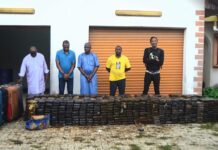By Yunus Yusuf
The Nigerian Midstream and Downstream Petroleum Regulatory Authority (NMDPRA) says inefficiencies and cost challenges are affecting Nigeria’s petroleum distribution infrastructure.
Mr Ogbugo Ukoha, Executive Director of Distribution, Storage System, and Retail Infrastructure of NMDPRA, disclosed this at the ongoing OTL Africa Summit on Thursday in Lagos.
Ukoha emphasised the urgent need for increased investment in the country’s coastal and port facilities to resolve these issues.
The News Agency of Nigeria (NAN) reports that his presentation, with the title “Nigeria Fuels Congress: Issues in Pricing, Policy, Profits and Market Access”, highlighted the role of enhanced infrastructure in reducing operational costs.
According to him, current port infrastructure limits the capacity to receive larger vessels, which raises costs significantly.
“The ability to accommodate LR1 vessels that can transport 90,000 to 150,000 metric tonnes is severely restricted. In contrast, we can handle only up to 60,000 tonnes at MRS,” Ukoha explained.
He further illustrated the logistical challenges, saying: “When we imported petrol directly from Rotterdam, we could discharge 90,000-ton vessels directly.
“Now, vessels must anchor in Lagos for ship-to-ship transfers, leading to smaller cargo deliveries and multiple voyages, which are costly.”
Ukoha pointed out that charter costs could range from $50,000 to $100,000 per day, with increased operational inefficiencies.
““These are inefficiencies we can eliminate. It’s not just about the availability of coastal vessels; the draft of the channels is also insufficiently deep. All these factors contribute to increased costs,” he said.
He said that to mitigate these challenges, “NMDPRA is advocating for investments in coastal infrastructure, including dredging and port upgrades, to facilitate larger vessels and lower transportation costs.”
Ukoha referenced a recent inspection that highlighted infrastructure limitations.
“Just days ago, we observed vessels queued at Escravos due to one vessel grounding, causing significant delays.
“Ports like Warri, Koko, and Oghara have a mere 6.5-meter draft at their entrances, posing risks of grounding.”
He stressed that the solution lied in securing the right investments and funding.
He urged commercial banks to collaborate with investors in this sector, stating that proper funding could significantly reduce operational costs and improve efficiencies.
Ukoha pointed out that areas like Lekki, with Pinnacle and Dangote’s port facilities, were among the few equipped to accommodate large vessels.
He added that the Apapa Jetty urgently needed upgrade to meet operational demands.
“Only in Lekki do we have Single Buoy Mooring (SBM) facilities that can receive MR1 vessels. We need more of such facilities, and substantial improvements are required at Apapa Jetty,” he said.
Highlighting additional inefficiencies, Ukoha lamented that distribution largely relied on trucking, which was costly and risky.
He called for investment in pipeline infrastructure, noting, “pipelines are the most efficient means of transporting products globally, and we need to return to that.
” Rail transport also offers opportunities, but we currently depend heavily on trucks, which is unsustainable.”
He shared a tragic example of the dangers of truck transport, referencing a mass grave in Jigawa, containing over 70 unidentified victims of trucking accidents.
“This is a tragic reality, and we need to encourage more investment in pipelines,” he stated.
Ukoha also emphasised the role of technology in combating petroleum diversion, particularly near Nigeria’s borders.
“With extensive borders, the risk of petroleum product diversion is high. Although monitoring borders isn’t NMDPRA’s primary role, we collaborate closely with Customs under Operation Whirlwind.
“The regulator is considering mandating automated trucks for better visibility of petroleum product movements,” he added.
He called for the full automation of licensing operations within the regulatory framework, and encouraged marketers to adopt these technologies for greater transparency.
On retail outlets, Ukoha suggested incentivising customer-centric and profitable retailers to foster industry improvements.
He said: “Before the unbundling of the Department of Petroleum Resources (DPR), retail outlets were required to store diesel, kerosene, and petrol.
“With the shift towards LPG and CNG, we need to encourage diversification in retail offerings.”
Discussing the NMDPRA’s plan for a national strategic petroleum reserve, Ukoha outlined a recent regulation that established a 60-day storage capacity for all petroleum products.
“This reserve aims to stabilise supply and prices during emergencies, such as the recent floods threatening northern Nigeria’s product supply.
“NNPC has significant storage capacity in northern Nigeria, and we look forward to collaborating with them and other stakeholders on this initiative,” he said.
According to Ukoha, strategic reserve regulation is not just about capital lockup, but one that aims to create a secure supply chain resilient to unforeseen disruptions.(NAN)



